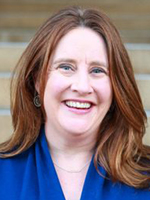Available March 22
Find New View EDU on Apple Podcasts, Google Play, Spotify, Stitcher, and many other podcast apps.
What does it mean to teach the future? Ruth Wylie applies imagination and critical thinking to big questions about science, technology, artificial intelligence, and what it means to shape the futures we want to see.
 As the assistant director for the Center for Science and the Imagination at Arizona State University, Ruth Wylie works on solving relevant problems through interdisciplinary exploration. Her projects bring together people from a variety of backgrounds and lived experiences, including science fiction authors, artists, researchers, and scholars. In this episode, Ruth joins Tim Fish and Lisa Kay Solomon to share some of the innovative and creative ways in which she and her colleagues have made complex futures thinking accessible and meaningful to students of all ages.
As the assistant director for the Center for Science and the Imagination at Arizona State University, Ruth Wylie works on solving relevant problems through interdisciplinary exploration. Her projects bring together people from a variety of backgrounds and lived experiences, including science fiction authors, artists, researchers, and scholars. In this episode, Ruth joins Tim Fish and Lisa Kay Solomon to share some of the innovative and creative ways in which she and her colleagues have made complex futures thinking accessible and meaningful to students of all ages.
Asserting that futures thinking is as valuable as historical understanding, Ruth advocates weaving discussions and imaginative explorations of possible futures into existing classroom study. Bringing the future into the classroom is about telling a “continuous story,” and it can be as simple as finding new ways to help students imagine their own successful futures, or as deep as inspiring them to change the future for everyone.
Key Questions
Some of the key questions Tim and Lisa explore in this interview include:
- What would it look like to place a “Center for Science and the Imagination” in K-12 schools?
- How can the study of science fiction in literature be used as a springboard for futures thinking?
- What are some examples of interdisciplinary projects that teach students to engage in conversations around scientific ethics and responsibility?
- What is the future of artificial intelligence in our world and in education? What implications should we consider from the perspectives of equity and ethics?
- What is the role of applied imagination in education? How do we identify it, encourage it, and can—or should—we measure it?
Episode Highlights
- “I think that even, you know, at maybe the most basic, but also perhaps some of the most profound, is to start to think about how to get futures thinking and foresight anticipation into our K-12 curriculum. So starting to encourage our young people to think about what are possible futures for themselves, but also getting away from the individual level and looking about what are possible futures for our communities, for our countries, for our world.” (5:44)
- “So when we're talking about futures, it's also about reflecting on our histories, our past, the indigenous knowledge. It's reflecting on what's happening today. And then it's about thinking about futures. So again, it's not about just creating a brand new course and hiring brand new teachers, but it's about creating a culture of futures thinking and embedding that into our everyday classroom practice.” (8:29)
- “And so we need to also be thinking about how we're building technologies to address equity, to address people across different lifespans, different spectrums. And I think it's really important again, that if we're going to be making decisions that have larger community, global, national impacts, we need to make sure that people from all of those different spheres are at the table when designing those technologies and thinking about the implications.” (18:50)
- “Agency is a construct that we talk a lot about at the center, and about how do we develop agency and shift that mindset away from ‘the future is going to be unveiled at the next press conference or it's being done by folks in white lab coats,’ and we really take and empower people to realize that they have agency over their future.” (27:48)
Resource List
- Learn more about Ruth and the Center for Science and the Imagination: https://csi.asu.edu/people/ruth-wylie/
- Read some of Ruth’s work: Cities of Light: A Collection of Solar Futures
- Explore the Smithsonian FUTURES exhibit: https://aib.si.edu/future_visions_pressrelease/
- Check out the Slate Future Tense project with Arizona State: https://slate.com/technology/future-tense
Full Transcript
About Our Guest
Ruth Wylie is the assistant director of the Center for Science and the Imagination and an associate research professor in the Mary Lou Fulton Teachers College at Arizona State University. She concentrates on interdisciplinary, translational research that leverages knowledge and insights from theory and laboratory studies to answer real-world problems. Her interests include using collaborative imagination to tackle global issues, from the climate crisis to improving formal and informal learning environments.